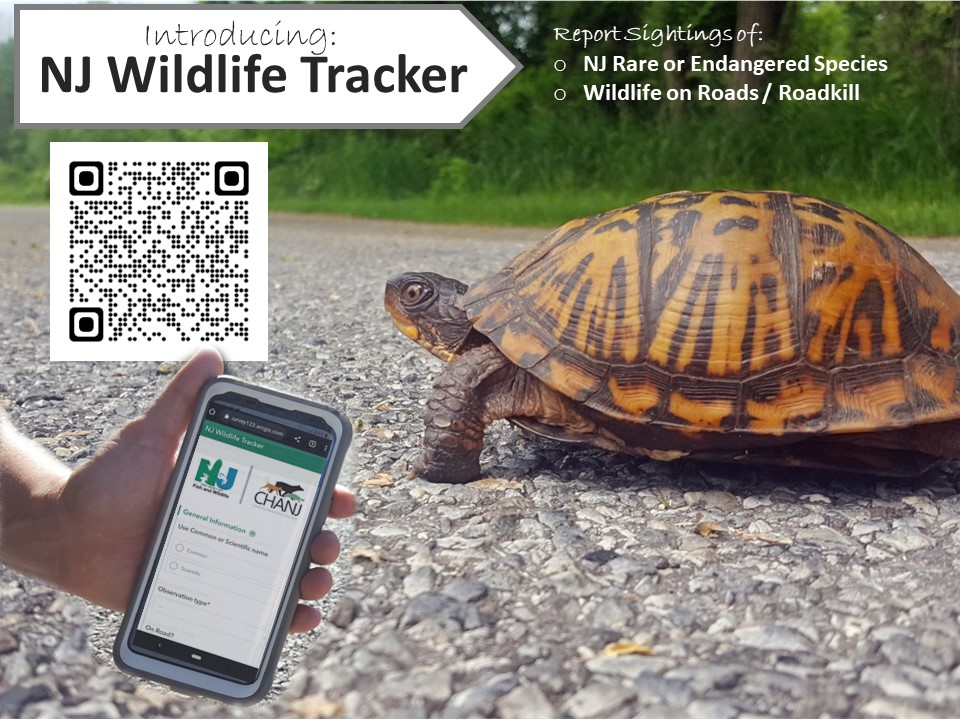Wildlife sightings from the public are incredibly useful to New Jersey Fish and Wildlife. If you’ve observed any of the following species in New Jersey, we’re interested! Please report your observations using the appropriate method* listed below.
*Please report dead-on-road Bobcat, River otter, Fisher, or Black bear by calling the DEP Action Line (1-877-WARN-DEP or 1-877-927-6337). NJFW biologists will record the location and pick up the carcass to collect samples from these species.
Rare Species (Non-Marine) and Wildlife on Roads
Use our online NJ Wildlife Tracker application to report: 1) rare wildlife species sightings as well as 2) observations of wildlife (of any kind) on roadways. Please practice “Safety First” in every situation, especially along roadways. Please also give wildlife their space. Click here for more resources if you find an injured animal or need help with wildlife in some other way.
NJ’s Endangered, Threatened, and Special Concern Species
The rare species sightings help us keep New Jersey’s Natural Heritage/Biotics inventory robust and current. These data contribute to our critical habitat mapping and help us monitor habitat occupancy and population trends over time, ultimately helping us to manage the recovery of rare wildlife species across the state. New Jersey’s Natural Heritage record is also a powerful conservation tool for land-users and natural area managers.
Observations of wildlife on roadways inform our Connecting Habitat Across New Jersey (CHANJ) project, which aims to make our landscape easier for wildlife to move through.
Featured Video
NJ Wildlife Tracker
July 11, 2024
The Summer of CHANJ continues! Wildlife sightings from the public are incredibly useful to NJDEP Fish & Wildlife. We recently launched the NJ Wildlife Tracker, a web application you can use from your cell phone or computer to report rare wildlife species observations and wildlife of any kind on roadways. Your sightings of wildlife on roads (dead or alive) will help our Connecting Habitat Across New Jersey (CHANJ) team identify problem spots across the state – like places with frequent roadkill or at-risk species being impacted by roads. These can point us towards opportunities to build safer road-crossings for animals… (Learn More)
Marine Rare Species
The Marine Protected Wildlife Reporter application allows the public to report sightings of, and encounters with, federally listed Endangered or Threatened marine species including marine mammals, sea turtles, Atlantic sturgeon, as well as prohibited shark species in the waters off New Jersey.
Birds (or Bats) with Bands
Wild birds are routinely banded to help track survival, migration, and dispersal. Anyone who finds a banded bird should record the band number, species (if known), location, and circumstances, and report it to the USGS Bird Banding Laboratory . The band will have a 9-digit number; color bands may have short codes.
State biologists are particularly interested in bands that are field-readable, such as those used on Bald eagles, Peregrine falcons, and some other species. For those band codes, record the code and band color, and the species, location, and date, and email that to ENSPTrentonVoicemail@dep.nj.gov. Banded birds that are found dead should always be reported to the Bird Banding Lab . Any endangered or threatened birds found dead should be reported to the DEP Hotline at 1-877-WARN-DEP.
Racing pigeons are banded with plastic color bands that may have codes; those are not reportable to the Bird Banding Lab but may be found online in pigeon owners clubs.
Bats are also routinely banded during studies. If you find a live bat that is banded, try to photograph the bat and get a close-up of the band numbers without touching or coming within a few feet of the bat. If the bat appears injured or in need of help, reach out to a NJ licensed wildlife rehabilitator who treats bats. If the bat you’ve found is dead, please make note of the location, collect it in a ziploc bag or a container if you’re willing (without directly touching the bat), or photograph the bat and its band numbers. Please report bat sightings to ENSPTrentonVoicemail@dep.nj.gov.
American Woodcock, Northern Bobwhite, or Ruffed Grouse
Please complete the Upland Bird Survey .
Beaver or River Otter, Coyote, Grey Fox, Fisher, Nutria, Muskrat, or Weasel
Please complete the Furbearers Survey .
Black Bear
Please contact the DEP Action Line at 1-877-WARN-DEP (1-877-927-6337).
Injured or Young Wildlife
Please see our separate page, Finding Injured or Young Wildlife, for guidance.
List of NJ Wildlife Rehabilitators
Wild Turkey
The Wild Turkey Brood Sighting Survey runs from July 1st to September 15th, with the goal of measuring the productivity and success of wild turkey broods across New Jersey each year.
 Official Site of The State of New Jersey
Official Site of The State of New Jersey

